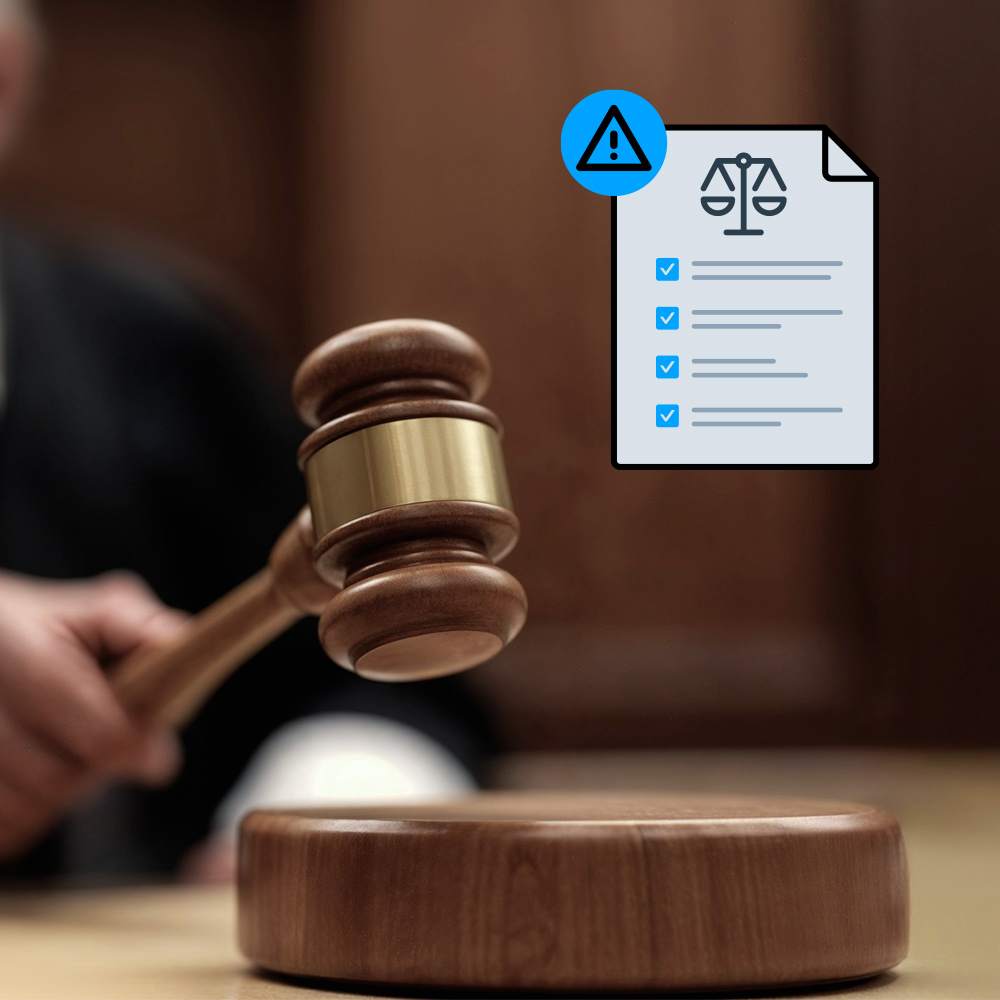Privacy policies are no longer optional in today’s digital environment. Whether you run a blog, a SaaS platform, mobile games, or a multinational e-commerce operation, chances are you collect personal information from visitors. And online, your customers can be anywhere in the world.
A privacy policy explains what data you collect, why, who may access it, how it is stored and shared, and what rights individuals have over their personal data and how to exercise them.
While privacy laws around the world vary in their requirements and strictness, the requirement to provide users with clear and comprehensive information about data use is standard. This is why your website, app, or other connected platform needs a privacy policy.
Let’s explore the purpose, importance, and requirements of privacy policies for growing companies in digital markets.
Key takeaways
- A privacy policy is a legal and ethical statement of how personal data is collected, used, and protected.
- Privacy policies are required by major privacy laws like the General Data Protection Regulation (GDPR) and the California Consumer Privacy Act (CCPA/CPRA).
- Nearly all websites and apps today need a privacy policy, from blogs to apps to global e-commerce businesses.
- A clear data privacy policy builds customer trust and demonstrates transparency.
- Businesses reduce regulatory, financial, and reputational risks with a compliant privacy policy.
- A company privacy policy explains not just data use but also user rights, such as access and deletion.
- The importance of a privacy policy extends beyond compliance — it supports sustainable customer relationships.
- Website privacy policy requirements are constantly evolving, making regular updates essential.
What is a privacy policy?
A privacy policy is a written statement that explains how a business or website collects, processes, stores, and shares personal information. It can be called a data privacy policy, privacy notice, customer privacy policy, or company privacy policy.
The document informs website visitors, app users, and others customers about:
- What types of data you collect
- Why you collect this data (aka processing purposes)
- How the data will be stored and protected (and how long you retain it)
- Whether it will be shared with third parties (and which ones, depending on the law)
- The rights users have under applicable privacy laws and how to exercise them
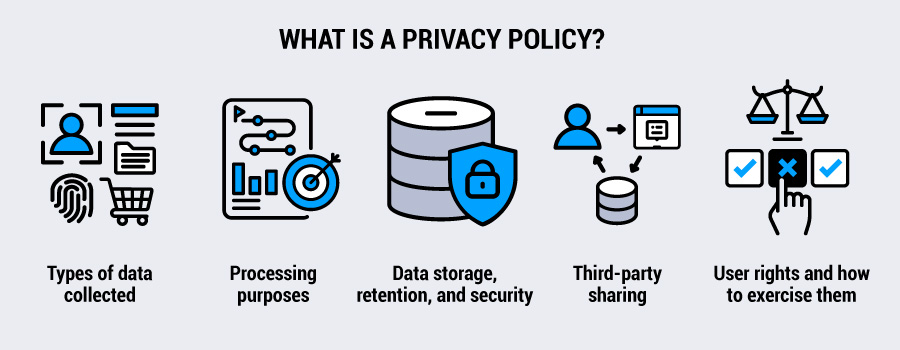
Different laws will have specific requirements, but those are the fundamental ones that privacy policies need.
At its core, a privacy policy is not just a privacy compliance requirement. It is also a tool for transparency and trust-building. Companies that clearly explain their data practices demonstrate accountability, which is increasingly important as data privacy concerns continue to grow.
Now you know that you need one. Next, find out how to write a privacy policy.
Do I need a privacy policy on my website?
If your website collects any personal data — names, email addresses, payment details, or even IP addresses and cookies — you need a privacy policy.
Why? Because personal data is protected by multiple global, regional, and industry-centric regulations, frameworks, and partner platform policies.
Even if your business is small or does not directly sell products online, using tools like Google Analytics, Facebook Ads, or email marketing platforms means you are handling user data.
Privacy policies are required by:
- Major regulations like the GDPR in Europe and the CCPA in California
- Advertising platforms and marketplaces such as Google, Meta, and Amazon
- App stores, including Apple’s App Store and Google Play, which mandate privacy disclosures for mobile apps
Simply put: unless your site is entirely static and collects no information at all, you need a privacy policy.
Learn more:Privacy policies of major platforms
The importance of an online privacy policy
A privacy policy is more than just a legal formality. It plays a central role in business operations, user relationships, and risk management.
Building customer trust and providing transparency
Today’s customers expect companies to handle their data responsibly — they’ll take their business elsewhere if they don’t feel they can trust your business.
A clear privacy policy shows that you respect their data and privacy, which helps build long-term trust and brand loyalty.
Complying with data privacy regulations
Global privacy laws are expanding quickly. The majority of the world’s population is already protected by at least one privacy law, and regulatory authorities are actively enforcing them. Governments are also making privacy disclosures mandatory. Without a proper privacy policy, you risk regulatory enforcement actions.
Reducing legal and financial risks with a business privacy policy
Fines for noncompliance can reach millions, even billions. Beyond monetary penalties, companies face reputational damage, loss of customer trust, operational disruption, and loss of growth opportunities if potential advertisers, partners, or investors go elsewhere. A privacy policy is one of the simplest ways to help mitigate these risks.
Legal requirements for a company privacy policy
Different jurisdictions have different rules. And, as noted, additional frameworks may apply and important partner platforms may have policy requirements. But that is more likely to affect what’s in your privacy policy, rather than whether one’s needed. At the very least, it’s a best practice and improves user experience.
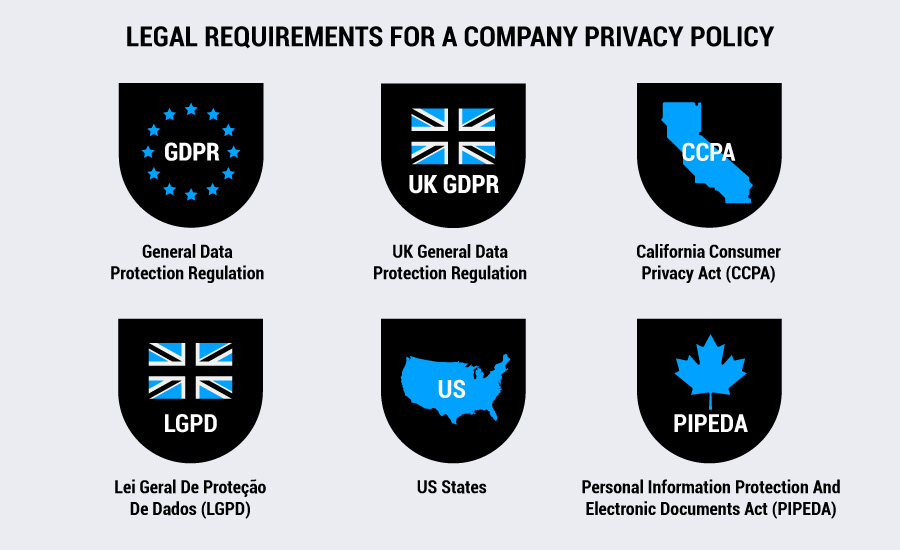
Here are some prominent data privacy laws and their privacy policy requirements:
- General Data Protection Regulation (GDPR): The jurisdiction is the European Union and European Economic Area, and it requires clear and accessible policies that explain lawful processing, data subject rights, and retention.
- UK General Data Protection Regulation (UK GDPR): Very similar to the EU GDPR, including requirements for detailed information on processing activities and data subjects’ rights.
- California Consumer Privacy Act (CCPA): The jurisdiction is the US state of California, and it requires businesses to disclose categories of data collected, purposes, and opt-out rights.
- Lei Geral de Proteção de Dados (LGPD): The jurisdiction is Brazil, and it’s similar in scope to GDPR, focusing on transparency and lawful grounds for processing.
- US states: There are over 20 US states with privacy laws to date, which generally require information on types of data collected, processing purposes, retention periods, information on sale or sharing, and information on user rights, including opt out.
- Personal Information Protection and Electronic Documents Act (PIPEDA): The jurisdiction is Canada, and it requires businesses to obtain consent and provide clear policies about how data is handled.
And remember, with many privacy laws, what matters is where your users and customers are located, not where your company is headquartered. You may also have to comply with multiple laws.
What other legal information do you have to provide on your website? Get our guide to website disclaimers.
What information do user privacy policies cover?
A comprehensive online privacy policy typically covers several key areas. We’ve outlined them, but let’s look at what they include in more detail.
Types of data collected
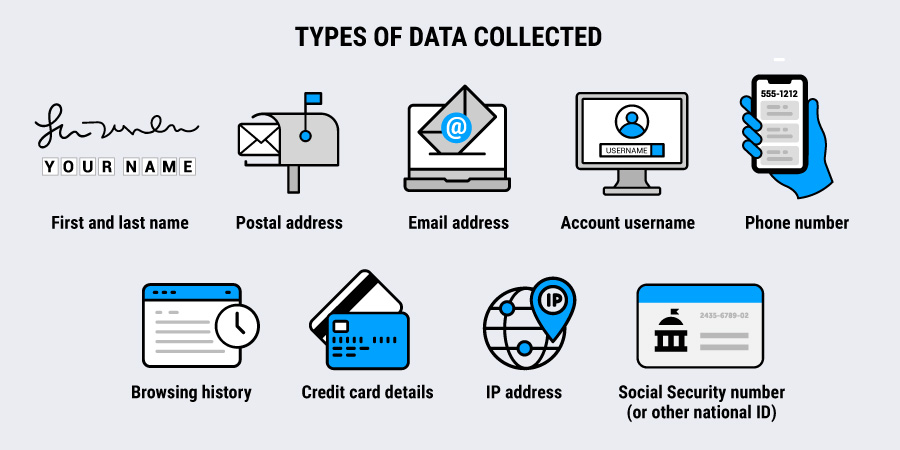
This can include personal details, identifiers, and behavioral data, for example:
- First and last name
- Postal address
- Email address
- Account username
- Phone number
- Browsing history
- Credit card details
- IP address
- Social Security number (or other national ID)
Some types of personal data are also categorized as sensitive under various laws due to their increased risk of harm if misused. Specific sensitive data types vary by law, but typically have restrictions for access and more stringent security requirements.
Many laws require you to be clear about how data is collected, which can include obvious mechanisms, like signup forms, but also less visible ones, like website cookies and trackers.
A consent management platform (CMP) with deep scanning technology can automate detecting these technologies in use, and providing a list that’s regularly updated — since they can change often — which can be embedded in your privacy policy to meet legal requirements.
Are your email campaigns privacy-compliant? Find out and get best practices:Email marketing privacy policy
Processing purposes: How data is used and shared
Data may be used for marketing, analytics, personalization, order fulfillment, or legal obligations. Privacy policies must disclose if information is shared with third-party vendors, partners, or advertising platforms, and what processing those companies do for you. This can range from in-page or in-app advertising, analytics services, e-commerce, or app store usage.
These third-party services may come from smaller vendors, or large companies like Apple, Google, Amazon, or Facebook. Remember that under many privacy laws you’re also responsible for the privacy compliance of third-party processors contracted to you.
Some laws, like the GDPR, LGPD, and South Africa’s Protection of Personal Information Act (POPIA), require a legal basis for processing data. User consent is one such basis, as is legitimate interest or contract fulfillment. The GDPR has six legal bases, whereas POPIA has five and the LGPD has 10.
Selecting the correct one for your data processing, where relevant, and communicating it in your privacy policy is important, as authorities can and will require justification for your choice and proof that you’re following its requirements.
Get our guide to data privacy and learn about key laws, compliance requirements, consent management, and how to stay up to date and build trust.
User rights under privacy laws — to include in your privacy policy
Most modern regulations grant individuals specific rights regarding access to their data and use of it. These rights vary by jurisdiction, and also include requirements for response times for requests, how identity verification is handled, and other factors.
Some of the most common data privacy rights are:
- Right of access to their data
- Right to correction
- Right to deletion
- Right to opt out of certain processing, like sale or targeted advertising
- Right to restrict access to sensitive personal data
- Right to data portability
- Right to information about (and opt out) of automated decision-making
- Right not to be discriminated against for exercising rights
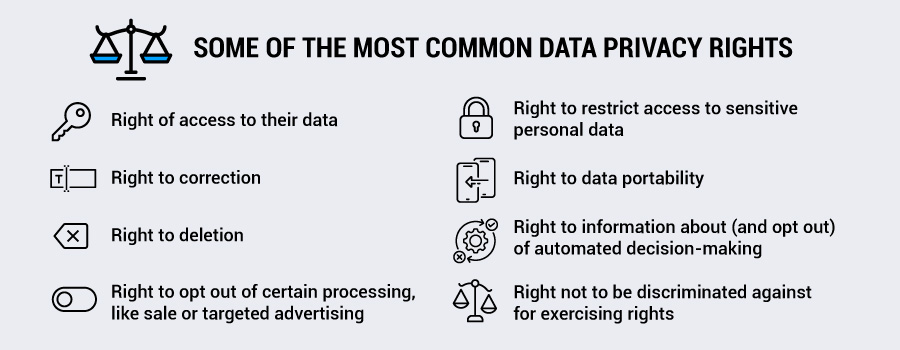
Your privacy policy needs to provide information about these rights, customized by applicable privacy law(s). However, you need to explain it in clear, simple language — no legal or technical jargon.
A CMP with geolocation functionality can help to display and update specific privacy policy information to users in different locations to support privacy compliance wherever you do business.
Who needs a privacy policy?
Essentially, anyone who processes personal data, whether one person with a WordPress blog, or a multinational corporation with a massive network of digital properties and business interests.
- Information-based websites: From simple blogs with contact forms to large corporate sites with many subdomains
- E-commerce businesses: From small online shops to global retailers, they all collect personally identifiable information, payment details, and purchase history
- SaaS providers: They handle account data, usage metrics, and payment information
- Mobile apps: They collect account data, geolocation, contacts, usage behavior, and payment information
- Publishers and marketers: They use cookies, tracking pixels, and ad platforms
If you collect, store, or share personal data in any form, you need a privacy policy to tell customers, visitors, and users about what data you collect, what you do with it, and what their rights are.
Since laws, technologies in use, and business operations change regularly, you need to keep your privacy policy up to date. Some laws mandate updating it at least once every 12 months.
A clear and comprehensive privacy policy helps you meet regulatory requirements and protect your business. But it’s also an important benefit for your brand and building long-term, engaged customer relationships built on trust.



